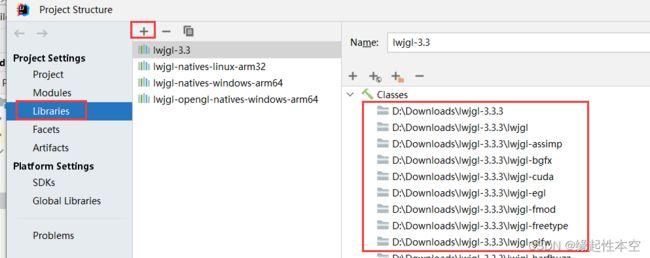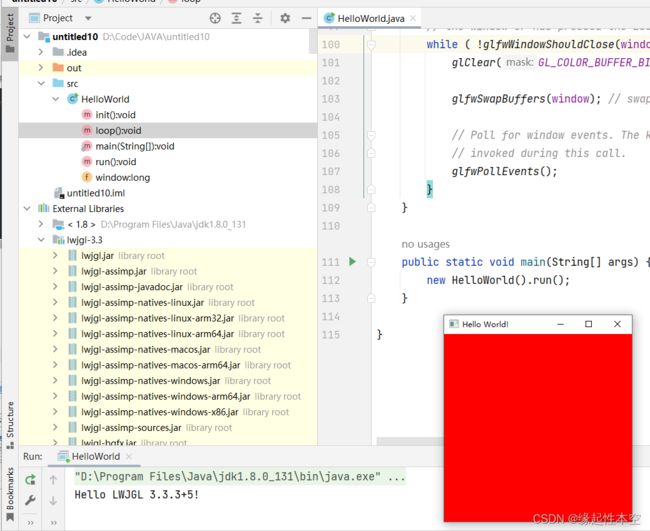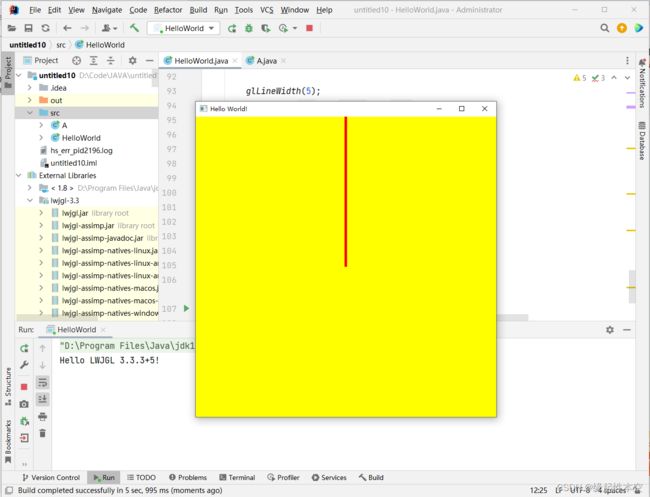【JAVA】使用OPENGL
从这个网址下载对应的库:
LWJGL - Lightweight Java Game Library![]() https://www.lwjgl.org/browse/release/3.3.3下载这个压缩包(实际上有很多版本3.3.3是比较新的版本:LWJGL - Lightweight Java Game Library):
https://www.lwjgl.org/browse/release/3.3.3下载这个压缩包(实际上有很多版本3.3.3是比较新的版本:LWJGL - Lightweight Java Game Library):
https://build.lwjgl.org/release/3.3.3/lwjgl-3.3.3.zip
注意,下载的这个压缩包解压后,解压后,里边的jar包会比较多,使用IDE(我使用的IDEA)创建工程后,要把这些LWJGL的库添加到工程:
这里是需要把整个解压目录里边所有Jar包添加进来,IDEA建立索引要花点时间,注意是子目录和子目录的Jar包:
如果上边这步没有问题,那么可以新建一个HelloWorld.java了,这里网站:
LWJGL - Lightweight Java Game Library![]() https://www.lwjgl.org/guide给了一个示例程序:
https://www.lwjgl.org/guide给了一个示例程序:
import org.lwjgl.*;
import org.lwjgl.glfw.*;
import org.lwjgl.opengl.*;
import org.lwjgl.system.*;
import java.nio.*;
import static org.lwjgl.glfw.Callbacks.*;
import static org.lwjgl.glfw.GLFW.*;
import static org.lwjgl.opengl.GL11.*;
import static org.lwjgl.system.MemoryStack.*;
import static org.lwjgl.system.MemoryUtil.*;
public class HelloWorld {
// The window handle
private long window;
public void run() {
System.out.println("Hello LWJGL " + Version.getVersion() + "!");
init();
loop();
// Free the window callbacks and destroy the window
glfwFreeCallbacks(window);
glfwDestroyWindow(window);
// Terminate GLFW and free the error callback
glfwTerminate();
glfwSetErrorCallback(null).free();
}
private void init() {
// Setup an error callback. The default implementation
// will print the error message in System.err.
GLFWErrorCallback.createPrint(System.err).set();
// Initialize GLFW. Most GLFW functions will not work before doing this.
if ( !glfwInit() )
throw new IllegalStateException("Unable to initialize GLFW");
// Configure GLFW
glfwDefaultWindowHints(); // optional, the current window hints are already the default
glfwWindowHint(GLFW_VISIBLE, GLFW_FALSE); // the window will stay hidden after creation
glfwWindowHint(GLFW_RESIZABLE, GLFW_TRUE); // the window will be resizable
// Create the window
window = glfwCreateWindow(300, 300, "Hello World!", NULL, NULL);
if ( window == NULL )
throw new RuntimeException("Failed to create the GLFW window");
// Setup a key callback. It will be called every time a key is pressed, repeated or released.
glfwSetKeyCallback(window, (window, key, scancode, action, mods) -> {
if ( key == GLFW_KEY_ESCAPE && action == GLFW_RELEASE )
glfwSetWindowShouldClose(window, true); // We will detect this in the rendering loop
});
// Get the thread stack and push a new frame
try ( MemoryStack stack = stackPush() ) {
IntBuffer pWidth = stack.mallocInt(1); // int*
IntBuffer pHeight = stack.mallocInt(1); // int*
// Get the window size passed to glfwCreateWindow
glfwGetWindowSize(window, pWidth, pHeight);
// Get the resolution of the primary monitor
GLFWVidMode vidmode = glfwGetVideoMode(glfwGetPrimaryMonitor());
// Center the window
glfwSetWindowPos(
window,
(vidmode.width() - pWidth.get(0)) / 2,
(vidmode.height() - pHeight.get(0)) / 2
);
} // the stack frame is popped automatically
// Make the OpenGL context current
glfwMakeContextCurrent(window);
// Enable v-sync
glfwSwapInterval(1);
// Make the window visible
glfwShowWindow(window);
}
private void loop() {
// This line is critical for LWJGL's interoperation with GLFW's
// OpenGL context, or any context that is managed externally.
// LWJGL detects the context that is current in the current thread,
// creates the GLCapabilities instance and makes the OpenGL
// bindings available for use.
GL.createCapabilities();
// Set the clear color
glClearColor(1.0f, 0.0f, 0.0f, 0.0f);
// Run the rendering loop until the user has attempted to close
// the window or has pressed the ESCAPE key.
while ( !glfwWindowShouldClose(window) ) {
glClear(GL_COLOR_BUFFER_BIT | GL_DEPTH_BUFFER_BIT); // clear the framebuffer
glfwSwapBuffers(window); // swap the color buffers
// Poll for window events. The key callback above will only be
// invoked during this call.
glfwPollEvents();
}
}
public static void main(String[] args) {
new HelloWorld().run();
}
}如果没有问题,运行的结果会是这样的:
下边这个代码是画一条直线:
import org.lwjgl.*;
import org.lwjgl.glfw.*;
import org.lwjgl.opengl.*;
import org.lwjgl.system.*;
import java.nio.*;
import static org.lwjgl.glfw.Callbacks.*;
import static org.lwjgl.glfw.GLFW.*;
import static org.lwjgl.opengl.GL32.*;
import static org.lwjgl.system.MemoryStack.*;
import static org.lwjgl.system.MemoryUtil.*;
public class HelloWorld {
// The window handle
private long window;
public void run() {
System.out.println("Hello LWJGL " + Version.getVersion() + "!");
init();
loop();
// Free the window callbacks and destroy the window
glfwFreeCallbacks(window);
glfwDestroyWindow(window);
// Terminate GLFW and free the error callback
glfwTerminate();
glfwSetErrorCallback(null).free();
}
private void init() {
// Setup an error callback. The default implementation
// will print the error message in System.err.
GLFWErrorCallback.createPrint(System.err).set();
// Initialize GLFW. Most GLFW functions will not work before doing this.
if ( !glfwInit() )
throw new IllegalStateException("Unable to initialize GLFW");
// Configure GLFW
glfwDefaultWindowHints(); // optional, the current window hints are already the default
glfwWindowHint(GLFW_VISIBLE, GLFW_FALSE); // the window will stay hidden after creation
glfwWindowHint(GLFW_RESIZABLE, GLFW_TRUE); // the window will be resizable
// Create the window
window = glfwCreateWindow(600, 600, "Hello World!", NULL, NULL);
if ( window == NULL )
throw new RuntimeException("Failed to create the GLFW window");
// Setup a key callback. It will be called every time a key is pressed, repeated or released.
glfwSetKeyCallback(window, (window, key, scancode, action, mods) -> {
if ( key == GLFW_KEY_ESCAPE && action == GLFW_RELEASE )
glfwSetWindowShouldClose(window, true); // We will detect this in the rendering loop
});
// Get the thread stack and push a new frame
try ( MemoryStack stack = stackPush() ) {
IntBuffer pWidth = stack.mallocInt(1); // int*
IntBuffer pHeight = stack.mallocInt(1); // int*
// Get the window size passed to glfwCreateWindow
glfwGetWindowSize(window, pWidth, pHeight);
// Get the resolution of the primary monitor
GLFWVidMode vidmode = glfwGetVideoMode(glfwGetPrimaryMonitor());
// Center the window
glfwSetWindowPos(
window,
(vidmode.width() - pWidth.get(0)) / 2,
(vidmode.height() - pHeight.get(0)) / 2
);
} // the stack frame is popped automatically
// Make the OpenGL context current
glfwMakeContextCurrent(window);
// Enable v-sync
glfwSwapInterval(1);
// Make the window visible
glfwShowWindow(window);
}
private void loop() {
GL.createCapabilities();
glClearColor(1.0f, 1.0f, 0.0f, 0.0f);
glClear(GL_COLOR_BUFFER_BIT);
glLineWidth(5);
glColor3f(1f, 0f, 0f);
glBegin(GL_LINES);
glVertex2i(0, 0);
glVertex2i(0, 2);
glEnd();
glfwSwapBuffers(window);
while (true)
{
glfwPollEvents();
}
}
public static void main(String[] args) {
new HelloWorld().run();
}
}显示效果如下:
其实最终不是想画直线,目标是画3D图形,带放大,旋转,平移等等功能的。。。
这部分代码很多不生效的,测试旋转、平移,是可以的:
import org.lwjgl.*;
import org.lwjgl.glfw.*;
import org.lwjgl.opengl.*;
import org.lwjgl.system.*;
import java.nio.*;
import static org.lwjgl.glfw.Callbacks.*;
import static org.lwjgl.glfw.GLFW.*;
import static org.lwjgl.opengl.GL32.*;
import static org.lwjgl.system.MemoryStack.*;
import static org.lwjgl.system.MemoryUtil.*;
public class HelloWorld {
// The window handle
private long window;
public void run() {
System.out.println("Hello LWJGL " + Version.getVersion() + "!");
init();
loop();
// Free the window callbacks and destroy the window
glfwFreeCallbacks(window);
glfwDestroyWindow(window);
// Terminate GLFW and free the error callback
glfwTerminate();
glfwSetErrorCallback(null).free();
}
private void init() {
// Setup an error callback. The default implementation
// will print the error message in System.err.
GLFWErrorCallback.createPrint(System.err).set();
// Initialize GLFW. Most GLFW functions will not work before doing this.
if ( !glfwInit() )
throw new IllegalStateException("Unable to initialize GLFW");
// Configure GLFW
glfwDefaultWindowHints(); // optional, the current window hints are already the default
glfwWindowHint(GLFW_VISIBLE, GLFW_FALSE); // the window will stay hidden after creation
glfwWindowHint(GLFW_RESIZABLE, GLFW_TRUE); // the window will be resizable
// Create the window
window = glfwCreateWindow(600, 600, "Hello World!", NULL, NULL);
if ( window == NULL )
throw new RuntimeException("Failed to create the GLFW window");
// Setup a key callback. It will be called every time a key is pressed, repeated or released.
glfwSetKeyCallback(window, (window, key, scancode, action, mods) -> {
if ( key == GLFW_KEY_ESCAPE && action == GLFW_RELEASE )
glfwSetWindowShouldClose(window, true); // We will detect this in the rendering loop
});
// Get the thread stack and push a new frame
try ( MemoryStack stack = stackPush() ) {
IntBuffer pWidth = stack.mallocInt(1); // int*
IntBuffer pHeight = stack.mallocInt(1); // int*
// Get the window size passed to glfwCreateWindow
glfwGetWindowSize(window, pWidth, pHeight);
// Get the resolution of the primary monitor
GLFWVidMode vidmode = glfwGetVideoMode(glfwGetPrimaryMonitor());
// Center the window
glfwSetWindowPos(
window,
(vidmode.width() - pWidth.get(0)) / 2,
(vidmode.height() - pHeight.get(0)) / 2
);
} // the stack frame is popped automatically
// Make the OpenGL context current
glfwMakeContextCurrent(window);
// Enable v-sync
glfwSwapInterval(1);
// Make the window visible
glfwShowWindow(window);
}
private void loop() {
GL.createCapabilities();
float rTri = 0.5f;
float rQuad = 1f;
glClearColor(1.0f, 1.0f, 0.0f, 0.0f);
glClear(GL_COLOR_BUFFER_BIT | GL_DEPTH_BUFFER_BIT); //清除屏幕和深度缓存
//-----------------------------------------
glLoadIdentity(); //重置当前的模型观察矩阵
glTranslatef(0.1f, -0.2f, -0.20f); //平移矩阵
glRotatef(30, 0.0f, 0.0f, 1.0f); //绕Z轴旋转30度
glLineWidth(1);
glColor3f(1f, 0f, 0f);
glBegin(GL_LINES);
glVertex2i(0, 0);
glVertex2i(0, 1);
glEnd();
//-----------------------------------------
glLoadIdentity(); //重置当前的模型观察矩阵
glTranslatef(-1.5f, 0.0f, -116.0f);
glRotatef(rTri, 0.0f, 1.0f, 0.0f); //绕Y轴旋转rTri度
//开始绘制三角形
glBegin(GL_TRIANGLES);
//前侧面
glColor3f(1.0f, 0.0f, 0.0f);
glVertex3f(0.0f, 1.0f, 0.0f); //上顶点
glColor3f(0.0f, 1.0f, 0.0f);
glVertex3f(-1.0f, -1.0f, 1.0f); //左下顶点
glColor3f(0.0f, 0.0f, 1.0f);
glVertex3f(1.0f, -1.0f, 1.0f); //右下顶点
//右侧面
glColor3f(1.0f, 0.0f, 0.0f);
glVertex3f(0.0f, 1.0f, 0.0f); //上顶点
glColor3f(0.0f, 0.0f, 1.0f);
glVertex3f(1.0f, -1.0f, 1.0f); //左下顶点
glColor3f(0.0f, 1.0f, 0.0f);
glVertex3f(1.0f, -1.0f, -1.0f); //右下顶点
//后侧面
glColor3f(1.0f, 0.0f, 0.0f);
glVertex3f(0.0f, 1.0f, 0.0f); //上顶点
glColor3f(0.0f, 1.0f, 0.0f);
glVertex3f(1.0f, -1.0f, -1.0f); //左下顶点
glColor3f(0.0f, 0.0f, 1.0f);
glVertex3f(-1.0f, -1.0f, -1.0f); //右下顶点
//左侧面
glColor3f(1.0f, 0.0f, 0.0f);
glVertex3f(0.0f, 1.0f, 0.0f); //上顶点
glColor3f(0.0f, 0.0f, 1.0f);
glVertex3f(-1.0f, -1.0f, -1.0f); //左下顶点
glColor3f(0.0f, 1.0f, 0.0f);
glVertex3f(-1.0f, -1.0f, 1.0f); //右下顶点
glEnd();
//绘制三角形结束
//-----------------------------------------
glLoadIdentity(); //重置当前的模型观察矩阵
glTranslatef(-1.5f, 0.0f, -117.0f); //越远的对象看起来越小
glRotatef(30, 1.0f, 1.0f, 0.0f); //绕X轴旋转rQuad度
//开始绘制正方形
glTranslatef(3.0f, 0.0f, 0.0f);
glBegin(GL_QUADS);
//顶面
glColor3f(0.0f, 1.0f, 0.0f);
glVertex3f(1.0f, 1.0f, -1.0f); //右上顶点
glVertex3f(-1.0f, 1.0f, -1.0f); //左上顶点
glVertex3f(-1.0f, 1.0f, 1.0f); //左下顶点
glVertex3f(1.0f, 1.0f, 1.0f); //右下顶点
//底面
glColor3f(1.0f, 0.5f, 0.0f);
glVertex3f(1.0f, -1.0f, 1.0f); //右上顶点
glVertex3f(-1.0f, -1.0f, 1.0f); //左上顶点
glVertex3f(-1.0f, -1.0f, -1.0f); //左下顶点
glVertex3f(1.0f, -1.0f, -1.0f); //右下顶点
//前面
glColor3f(1.0f, 0.0f, 0.0f);
glVertex3f(1.0f, 1.0f, 1.0f); //右上顶点
glVertex3f(-1.0f, 1.0f, 1.0f); //左上顶点
glVertex3f(-1.0f, -1.0f, 1.0f); //左下顶点
glVertex3f(1.0f, -1.0f, 1.0f); //右下顶点
//后面
glColor3f(1.0f, 1.0f, 0.0f);
glVertex3f(1.0f, -1.0f, -1.0f); //右上顶点
glVertex3f(-1.0f, -1.0f, -1.0f); //左上顶点
glVertex3f(-1.0f, 1.0f, -1.0f); //左下顶点
glVertex3f(1.0f, 1.0f, -1.0f); //右下顶点
//左侧面
glColor3f(0.0f, 0.0f, 1.0f);
glVertex3f(-1.0f, 1.0f, 1.0f); //右上顶点
glVertex3f(-1.0f, 1.0f, -1.0f); //左上顶点
glVertex3f(-1.0f, -1.0f, -1.0f); //左下顶点
glVertex3f(-1.0f, -1.0f, 1.0f); //右下顶点
//右侧面
glColor3f(1.0f, 0.0f, 1.0f);
glVertex3f(1.0f, 1.0f, -1.0f); //右上顶点
glVertex3f(1.0f, 1.0f, 1.0f); //左上顶点
glVertex3f(1.0f, -1.0f, 1.0f); //左下顶点
glVertex3f(1.0f, -1.0f, -1.0f); //右下顶点
glEnd();
//绘制正方形结束
//-----------------------------------------
rTri += 5;
rQuad += 5;
//————————————————
//版权声明:本文为CSDN博主「贝勒里恩」的原创文章,遵循CC 4.0 BY-SA版权协议,转载请附上原文出处链接及本声明。
//原文链接:https://blog.csdn.net/Mr_robot_strange/article/details/123682686
glfwSwapBuffers(window);
while (true)
{
glfwPollEvents();
}
}
public static void main(String[] args) {
new HelloWorld().run();
}
}


